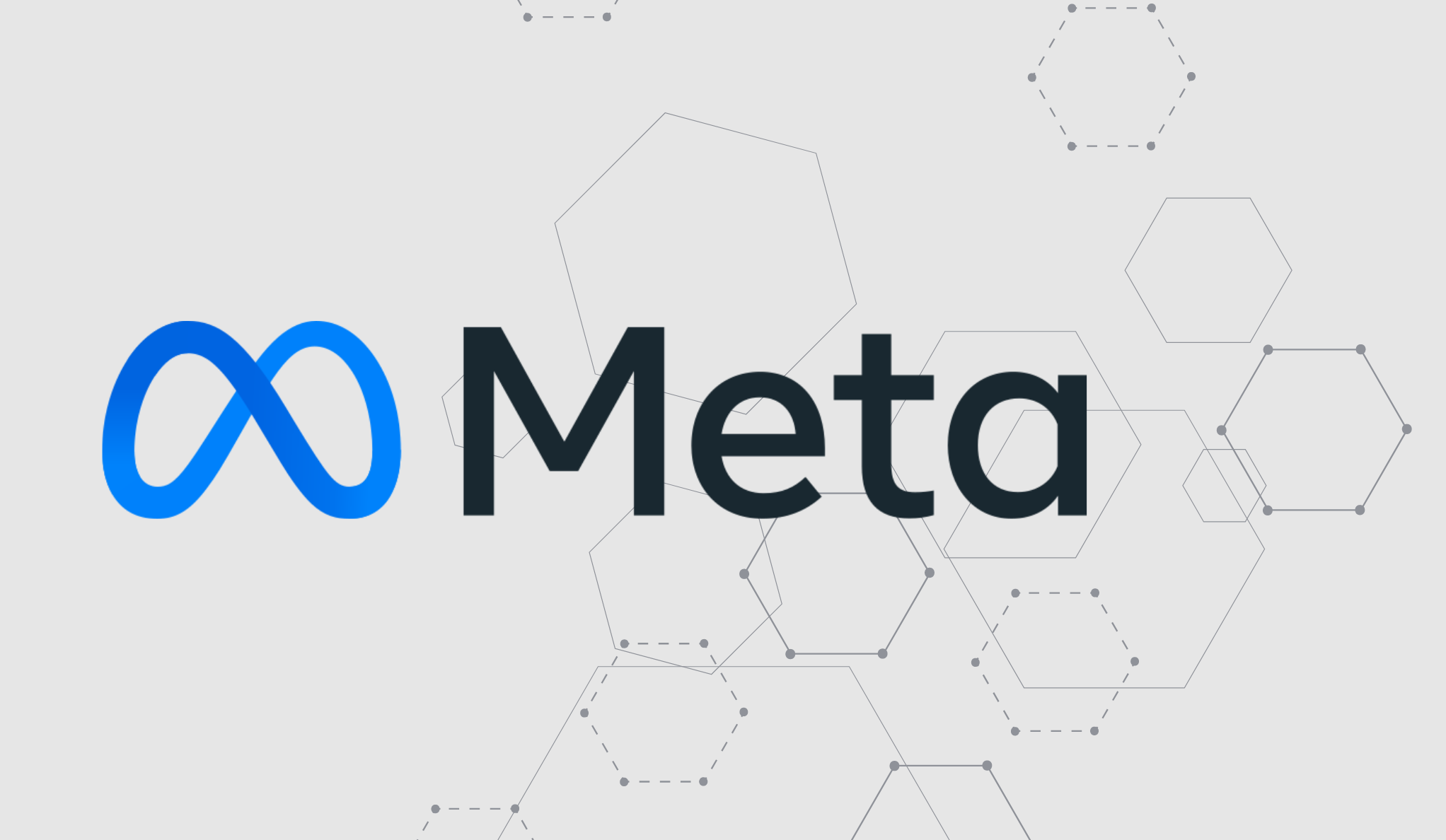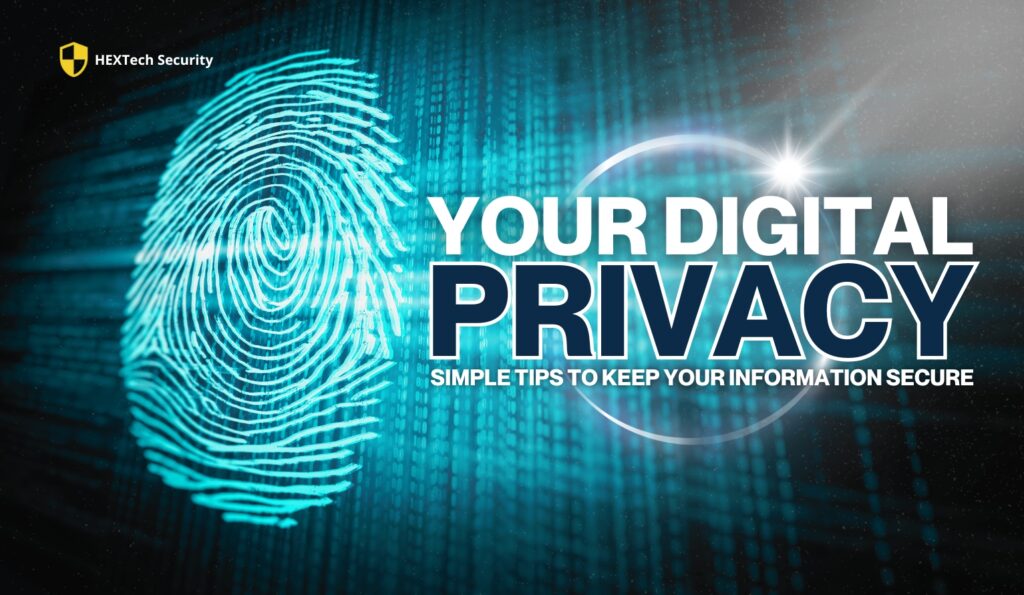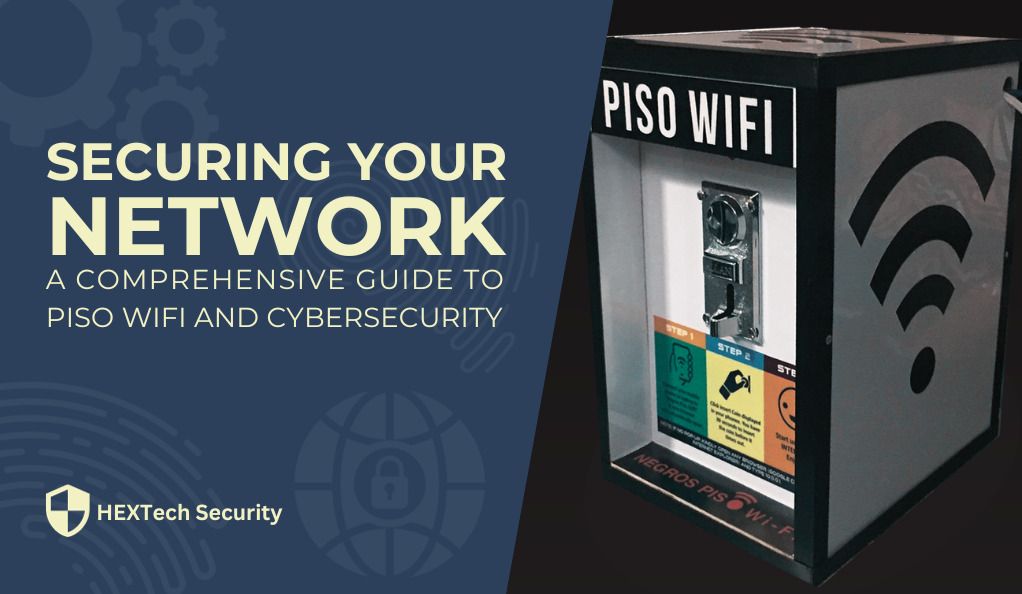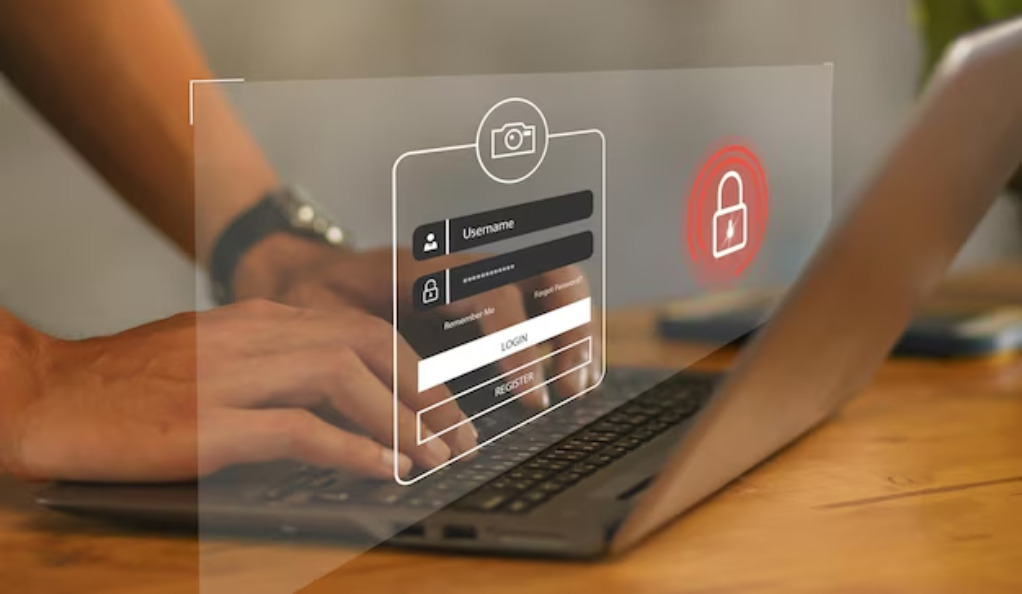In the rapidly evolving digital age, where the boundaries of privacy and intellectual property are in constant flux, a profound understanding of Meta copyright infringement is more crucial than ever. This essential knowledge extends beyond merely safeguarding our digital footprints; it plays a pivotal role in ensuring that we navigate the vast realm of online content with a deep respect for the intellectual property rights of others. By comprehensively grasping these principles, we not only protect ourselves from legal pitfalls but also contribute to a respectful and lawful online community.
Digital Privacy and Protection
Digital privacy and protection refer to the rights and measures to secure personal and sensitive information online. In an era where data breaches and identity theft are rampant, understanding digital privacy is essential. It involves knowing how your data is collected, used, and protected on various platforms. Protection strategies include using strong passwords, being aware of privacy settings, and understanding the terms of service of digital platforms.
Overview of Meta Copyright Infringement
Meta Platforms, Inc., particularly known for Facebook and Instagram, has stringent policies to prevent copyright infringement. Copyright infringement occurs when someone uses copyrighted material without permission from the right holder. On Meta platforms, this translates to sharing photos, videos, or music that you do not own or have no rights to distribute. Meta’s system, designed to detect and address such violations, plays a vital role in maintaining the integrity of digital content and protecting the rights of creators.
What is Meta Copyright Infringement?
In today’s digital world, where sharing content online is a daily activity for many, understanding copyright infringement is essential, particularly on major social media platforms like those owned by Meta Platforms, Inc. This infringement occurs when copyrighted content is used without permission from the copyright holder, a practice that can lead to legal consequences.
Definition and Explanation of Copyright Infringement in the Digital Context
Copyright infringement in the digital realm involves using someone else’s copyrighted material without permission. This can include copying, sharing, or distributing music, videos, images, or text online. In simple terms, if you didn’t create it, and you don’t have permission or a legal right to use it, sharing it could constitute infringement. This is critical in an age where digital content is easily accessible and sharable.
Specific Reference to Meta Platforms (like Facebook, Instagram)
Meta Platforms, particularly Facebook and Instagram, are hotspots for sharing digital content. However, this also makes them common places for unintentional copyright infringement. For instance, using a copyrighted song in a Facebook video or sharing a professional photographer’s images on Instagram without consent can be infringement. Meta uses automated systems to detect and prevent such unauthorized use. Users may face content removal, account suspension, or legal action in severe cases.
How to Identify Copyright Infringement
Identifying copyright infringement, especially on social media platforms like those owned by Meta, is crucial for both content creators and everyday users. Being informed about what constitutes infringement helps in navigating the digital landscape responsibly and respecting the intellectual property of others.
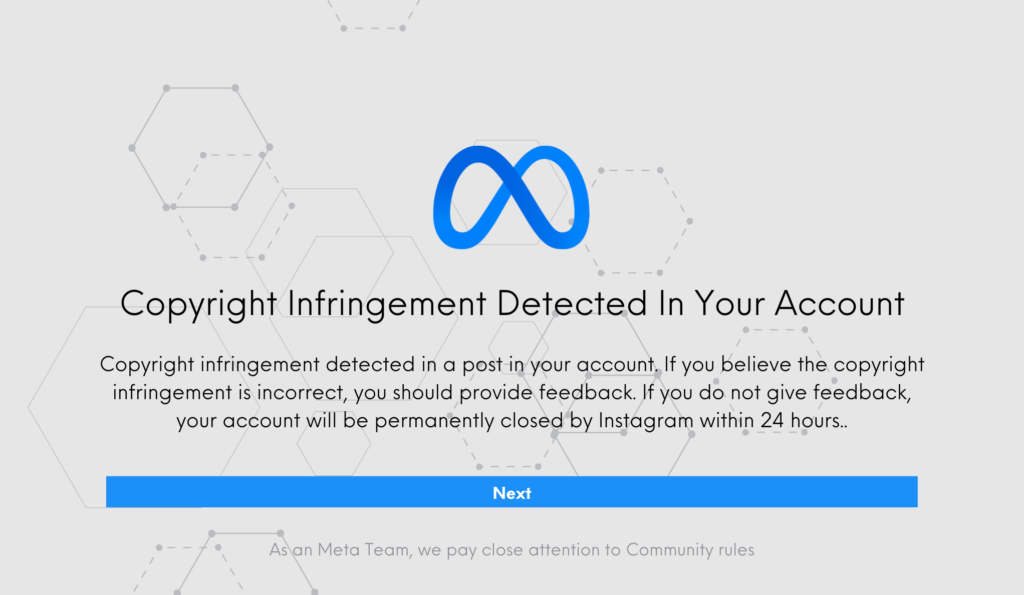
Signs of Copyright Infringement on Meta Platforms
On Meta platforms, such as Facebook and Instagram, signs of copyright infringement can be subtle yet significant. Key indicators include:
- Unauthorized Use of Media: Using images, videos, or music that you do not own or have no express permission to use.
- Content Removal Notices: Receiving notifications from Meta about removed content due to copyright claims.
- Account Restrictions: Experiencing limitations on your account functionalities, which can be a result of repeated copyright violations.
Differences Between Legitimate Use and Infringement
Understanding the difference between legitimate use and infringement is vital:
- Fair Use vs. Infringement: Fair use allows limited use of copyrighted material without permission for purposes like criticism, news reporting, or research. In contrast, infringement involves using copyrighted material without rights or permission, especially for commercial gains.
- Original Content vs. Copied Content: Creating and sharing your own original content is legitimate, while copying someone else’s work without their permission is not.
- Permission and Licensing: Legitimate use often involves having explicit permission or a license from the copyright owner, whereas infringement does not.
Meta’s Policies on Copyright Infringement
Meta Platforms, Inc., which operates major social media platforms like Facebook and Instagram, has developed comprehensive policies to address copyright infringement. These policies are crucial for maintaining the balance between protecting the rights of content creators and the freedom of expression for users.
Overview of Meta’s Copyright Policies
Meta’s approach to copyright is designed to respect the rights of creators while enabling sharing and connectivity. The key aspects of their policies include:
- Respect for Intellectual Property: Meta requires users to only post content that they have created or have permission to use.
- Rights Manager Tool: A technology used by Meta to identify and protect copyrighted material.
- Reporting Mechanisms: Users can report suspected copyright violations directly through the platforms.
- Compliance with Legal Requests: Meta responds to valid legal notices and court orders regarding alleged copyright infringement.
How Meta Detects and Acts on Copyright Infringement Cases
Meta employs a combination of technology, user reports, and legal processes to detect and act on copyright infringement:
- Automated Detection Systems: These systems scan uploaded content against a database of copyrighted material.
- User Reports: Users can flag content they believe infringes on their copyright.
- Actions Taken: When infringement is detected, actions may include removing the content, restricting user access, or in severe cases, legal action.
- Appeal Process: Users can appeal against a decision if they believe their content was mistakenly identified as infringing.
Responding to Meta Copyright Infringement Notices
Receiving a copyright infringement notice from Meta can be unsettling. It’s important to understand how to respond appropriately to these notices to ensure your content aligns with Meta’s policies and to protect your rights.
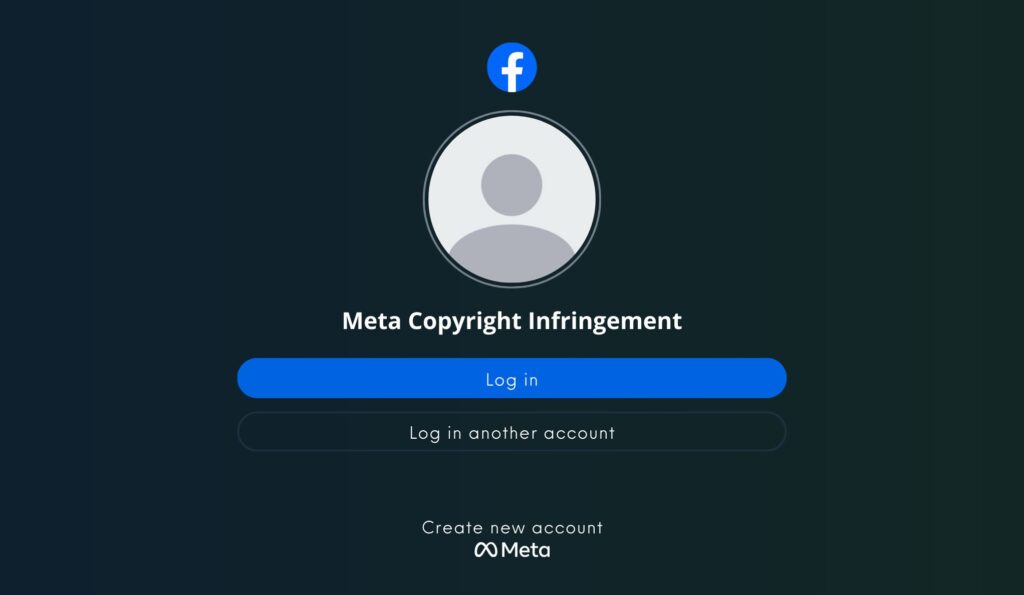
What to Do When You Receive a Copyright Infringement Email or Message from Meta
If you receive a notice from Meta regarding copyright infringement, here are the steps you should follow:
- Read the Notice Carefully: Understand why your content was flagged. Meta’s notice will usually specify the content in question and the reason for its removal.
- Review Your Content: Check the content you posted against the claim. Confirm whether it includes copyrighted material that you don’t have permission to use.
- Remove or Replace Content: If the claim is valid, you may need to remove or replace the copyrighted material from your post.
- Contact the Rights Holder: If possible, you can reach out to the rights holder for permission to use the content.
Steps to Dispute a Claim If You Believe It’s a Mistake
Sometimes, you might believe that the infringement claim is a mistake. In such cases, you can take the following steps to dispute the claim:
- Gather Evidence: Collect evidence that proves you own the content or have permission to use it.
- Submit an Appeal: Use Meta’s provided mechanism for appeals to dispute the claim. Include your evidence and a clear explanation of why the content does not violate copyright laws.
- Wait for a Response: After submitting your appeal, wait for Meta to review your case and respond. This process can take some time.
Preventing Copyright Infringement on Meta Platforms
In the dynamic world of social media, preventing copyright infringement is vital. Understanding and applying best practices when sharing content on platforms like Facebook and Instagram, which are part of Meta Platforms, Inc., is key to avoiding legal issues and respecting the creative work of others.
Best Practices for Sharing Content on Meta Platforms
When sharing content on Meta platforms, consider the following best practices:
- Use Original Content: Whenever possible, create and share content that you’ve made yourself.
- Seek Permission: If you want to use someone else’s work, always get permission from the copyright holder.
- Credit the Creator: Even with permission, it’s good practice to give credit to the original creator.
- Understand Fair Use: Be aware that fair use is limited and does not cover all types of content sharing.
- Utilize Royalty-Free or Creative Commons Media: If you need to use external content, consider using media that is royalty-free or available under Creative Commons licenses.
Importance of Understanding Copyright Laws
Understanding copyright laws is crucial for anyone using social media platforms for the following reasons:
- Legal Compliance: Knowing the laws helps you stay within legal boundaries and avoid infringement.
- Respect for Creators’ Rights: Understanding these laws fosters respect for the rights of content creators.
- Informed Sharing: Being informed allows you to share content responsibly and ethically.
Navigating Legal Aspects of Copyright on Social Media
In the age of social media, understanding the legal aspects of copyright is fundamental for anyone who creates, shares, or uses content online. This awareness helps in avoiding legal pitfalls and respecting the intellectual property of others.
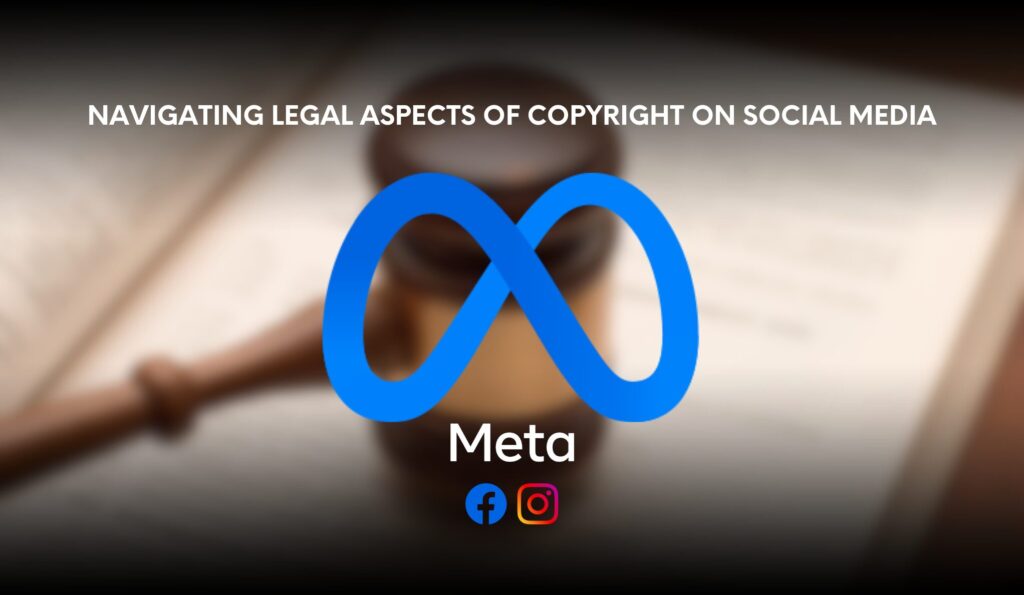
Brief Overview of Legal Considerations and Ramifications
The legal landscape of copyright on social media includes:
- Copyright Law Application: Copyright laws apply to all content shared on social media, regardless of the platform.
- Potential Legal Consequences: Infringing on someone’s copyright can lead to lawsuits, financial penalties, and even criminal charges in severe cases.
- International Variations: Copyright laws can vary significantly from one country to another, affecting how content is used globally.
Tips for Content Creators and Businesses on Social Media
For content creators and businesses, the following tips are crucial:
- Understand Copyright Basics: Know what is protected under copyright law and what is not.
- Seek Permissions: Always get permission to use someone else’s copyrighted content.
- Use Licensed or Free-to-Use Content: Opt for content that is either licensed for commercial use or is in the public domain.
- Implement Attribution Properly: When using someone else’s content, make sure to credit them correctly.
- Stay Informed: Regularly update yourself on changes in copyright laws and social media policies.
Conclusion
Navigating the complexities of copyright on Meta platforms requires a blend of awareness, respect for intellectual property, and proactive measures. This article aimed to shed light on the vital aspects of understanding and dealing with copyright infringement in the context of Meta’s social media platforms. From identifying infringement signs to responding to notices and understanding Meta’s policies, the information provided serves as a guide for users to engage responsibly online. For content creators and businesses, adhering to best practices and staying informed about legalities is crucial. As the digital landscape continues to evolve, being informed and respectful of copyright laws ensures a harmonious and creative online environment. Remember, the essence of respecting copyright on social media is not just about avoiding legal issues but also about fostering a culture of respect and creativity.

